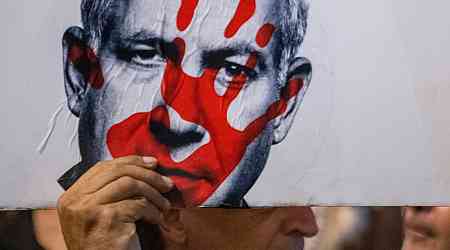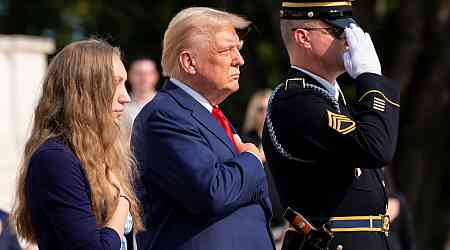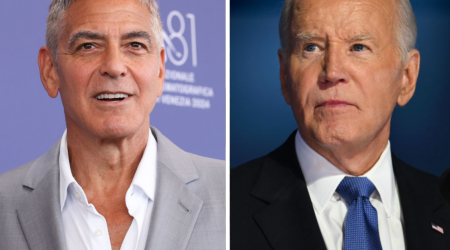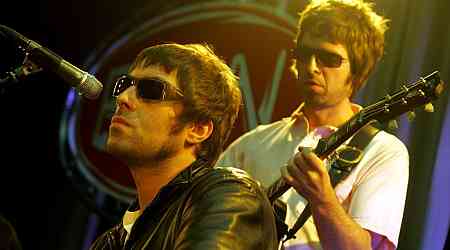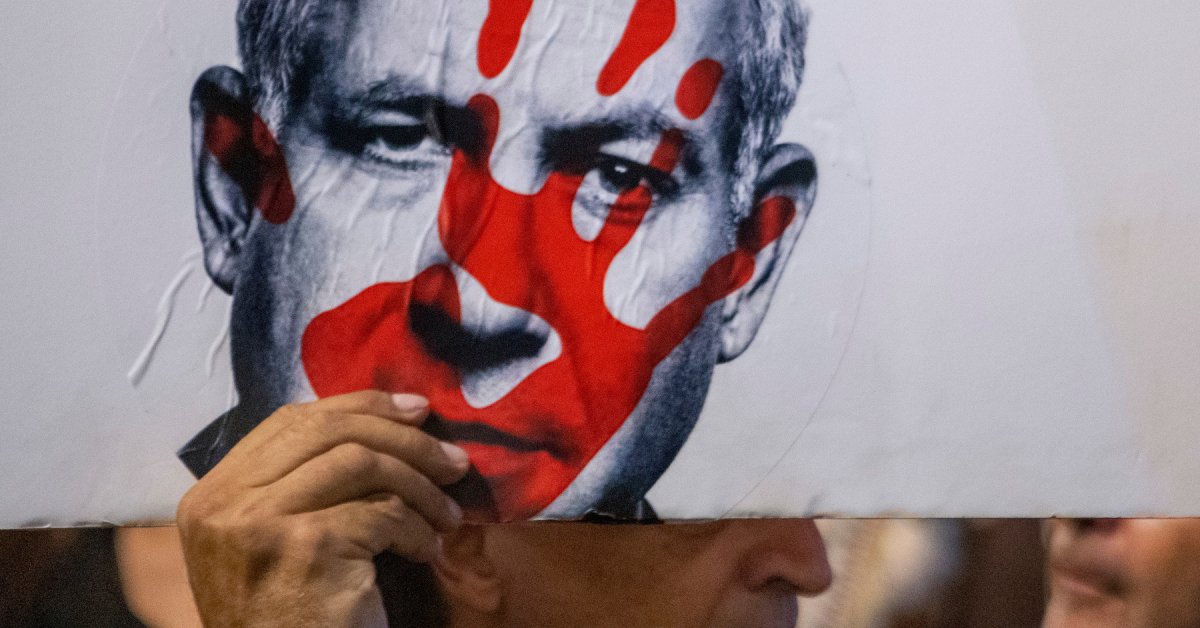
There is a word that until now was not used by Israelis to describe their Prime Minister, Benjamin Netanyahu. Yesterday it was everywhere: in red on handmade signs at the protests that broke out across the country, on angry social media posts in Hebrew, and in the mouths of outraged citizens:
[time-brightcove not-tgx=”true”]“Murderer.”
The judgment followed the bitter news on what was supposed to be a joyous first day of the school year, Sept. 1. Not only were six more Israeli hostages in Gaza found dead. The details of their deaths shocked the country to the core. All six were killed just hours before Israeli soldiers found their bodies. The army said each died by multiple gunshot wounds to the head, apparently by execution.
Hersh Goldberg-Polin, 23, Eden Yerushalmi, 24, Ori Danino, 25, Almog Sarusi, 27, Alex Lobanov, 32, and Carmel Gat, 40, had survived almost a year as hostages. When their bodies were discovered in a tunnel in southern Gaza, many Israelis blamed Netanyahu for their deaths, saying they would be alive if the Prime Minister had agreed to a cease-fire freeing them.
“I couldn’t believe it,” said Dudu Cohen, 73, who traveled with his wife from the West Bank settlement of Efrat to the protest outside the Prime Minister’s Office in Jerusalem. “It’s terrible. If there had been a deal last week, they would be alive.”

Something broke for many Israelis on Sunday. The reaction to the deaths was spontaneous and widespread. Some half a million people took to the streets, demonstrating on bridges, blocking highways, marching through cities across the country in what were likely the largest protests since Oct. 7. The largest union in the country, the Histadrut, declared a strike for Monday. Someone painted “Netanyahu is a murderer” on one of the Prime Minister’s cars.
“I directly accuse our Prime Minister of murder,” Ido Bruno, a professor of industrial design and former director of the Israel Museum, declared over the shouts at the Jerusalem protest. “Although Hamas were the ones that pulled the trigger, Netanyahu was the one who wrote the verdict. He executed them.”
Netanyahu claimed that “Israel has been holding intensive negotiations with the mediator in a supreme effort to reach a deal” to bring back the hostages. But Israeli Channel 12 News reported on Friday that Netanyahu had given up on talks. During the Thursday meeting of the Israeli war cabinet, Netanyahu reportedly told Defense Minister Yoav Gallant that keeping Israeli soldiers along the Gazan border with Egypt (known as the Philadelphi Corridor) was more important than saving the lives of the remaining hostages in Gaza. A shouting match ensued with Gallant reportedly saying, “The significance of this is that Hamas won’t agree to it, so there won’t be an agreement and there won’t be any hostages released,” to which Netanyahu reportedly replied: “This is the decision.”
While most of the world is preoccupied by the massive death toll among Palestinians in Gaza, some 40,000 of whom have been reported killed, Israelis remain focused on the fate of the 250 hostages taken into the enclave on Oct. 7, when Hamas launched a surprise attack that killed some 1,200 in Israel. Scores of the captives have been recovered in an earlier prisoner exchange and a few in rescue operations, but some 100 remain in Gaza, a third of whom are thought by Israeli authorities to be dead.
Bruno, like many other Israelis, blames Netanyahu for blocking an agreement with Hamas to release them, because it would provoke defections in the coalition government that relies on far-right parties. “He has done everything in his power over the last 11 months to prevent any sort of a deal,” said Bruno. “It’s very clear his only interest is to continue the war as long as possible because that’s the only way he can stay in power.”
The recent deaths of the six hostages exposed the deep rift in Israeli society among those who prefer to continue the military operation in Gaza and those who believe the state has a moral duty to first and foremost bring home the people who were snatched from their beds, the Nova festival, or their workplaces.
“People won’t rest until they have (Hamas leader Yahya) Sinwar’s head on a stick, but it’s not worth the price and it’s not going to happen anytime soon,” said Na’ama Kenan, a tech worker and mother of two, at the Jerusalem protest. Kenan, 40, was taking turns with her husband: She attended the Jerusalem protest, while he took care of the kids and she would take care of the kids while he went to the Tel-Aviv protest. “I don’t understand how people have come to the point that they think sacrificing people is just for any cause. Sacrificing soldiers, sacrificing hostages. I can’t grasp this.”
In Tel-Aviv, some 300,000 people came out to protest, carrying six “symbolic coffins.” They blocked the main highway and lit a bonfire in its midst. Police threw stun grenades and blasted water cannons at demonstrators and detained 29 of them.

Einav Zangauker, mother of Matan, who was kidnapped from the music festival, was on the podium. Zangauker has been traveling from protest to protest for months, speaking at gatherings of even a couple dozen. On Sunday she declared to several hundred thousand that “Netanyahu is murdering the hostages. He decided to sentence them to death.”
Of the man she says she had voted for, Zangauker said: “The history books will not have sufficient space to record the magnitude” of the disaster he has brought upon the country and the nation. “Your time is up. I, Einav Zangauker, a Likudnik from Ofakim, tell you, it’s over.”
“Go to the streets, people of Israel. Go to the streets!”
They already had. In Jerusalem, thousands shouted and blew whistles and eardrum-bursting trumpets outside the Prime Minister’s office. “We will not give this security cabinet a moment of quiet until all the hostages are released!” one man yelled into the loudspeaker, encouraging protesters to “Shout, shout, shout!” A mother of a hostage shared her anguish in a cracking voice: “This can’t go on, this is unreal, enough, ENOUGH!” A woman in a black dress sat down on a large rock and sobbed.
Yuval Kaminsky maneuvered through the throngs wearing his newborn daughter on his chest while his wife, Yam Gal, kept hold of their two-year-old son. Kaminsky, a filmmaker, believed the news was a watershed moment for Israelis, and he pondered how a breakthrough could be made. “We are horrified. It’s a feeling that we can’t continue this way anymore. Although, we are continuing this way for a long time. We are just waiting for an excuse to go out and end this once and for all. Because it won’t end without people taking to the streets.”
There was, however, a sense of impotence amid the unity, public opinion having failed for months to move the nation’s political leadership. Kaminsky said that something extreme was needed to bring about change. “We don’t need a wave of protests. We need one really, really big one … and a little violence I suppose. That’s how things happen, apparently,” he said. “I don’t think I’m in favor of physical violence, but … it needs to be aggressive, very aggressive. Damage property.”
Among the dead were the two hostages who became icons in Israel: Hersh Goldberg-Polin and Carmel Gat. Hersh, the Israeli-American who was seen in the back of a Hamas pick-up truck in an Oct. 7 video with his arm blown off, was thought likely dead until Hamas released a video in April of him alive. Pictures of him are everywhere in Jerusalem, hanging from balconies and covering bus stops. His mother, Rachel, had become an international ambassador for the hostage families, calling on the government to agree to a deal in order to save the nation as well as her son. Carmel Gat was taken hostage from Kibbutz Be’eri and taught other hostages yoga and meditation to help them survive captivity.
“People felt very close to Hersh and Carmel without knowing them,” said Bruno. “It touches you in a different place. We can’t bear the thought that we know that these people were alive and could still have been alive.”
Cohen, the settler, is among the few Israelis who believe that Israel should have accepted Hamas’ offer on Oct. 7 to exchange all the hostages for all the Palestinian prisoners and detainees in Israeli jails. “I think that on the 8th of October, we should have announced to them that they struck us and that we are prepared to do a deal of all of theirs for all of ours,” said Cohen. “And then we needed to find the opportunity to strike them as we should after the hostages are back with us. There is always an opportunity to strike them. Hostages are something that is perishable.”



















